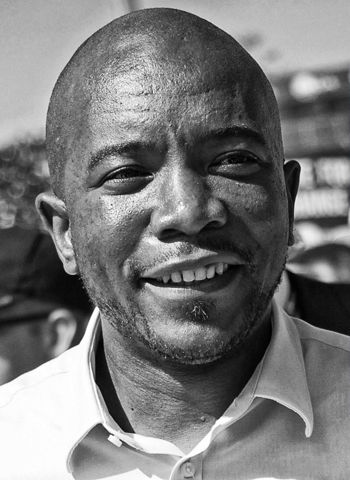Finance Minister Enoch Godongwana will table the National Budget on Wednesday 21 February 2024 at a time of great uncertainty and palpable national discord.
Millions of citizens are struggling to make ends meet, many are trapped in poverty and joblessness and without hope for a better future. Millions more remain anxious about what life in South Africa will look like 10 years from now if there is no substantive positive change. And the indicators at present do not inspire confidence.
SOE money pits
Just days before Minister Godongwana tables the National Budget before Parliament, the National Treasury — his government department — predictably set the scene by bringing before Parliament the government expenditure report for our country’s numerous state-owned enterprises (SOEs).
The report detailed the almost lifeless state of our SOEs — confirming that billions of rands continue to flow into these ailing entities. The most recent figures spell genuine trouble. Eskom recorded a R7.5-billion loss, SAA a R776-million loss, and the Post Office a R976-million loss. Transnet is in debt to the tune of R14-billion, while Denel made a R463-million loss.
The government shows no signs of either improving governance at SOEs or selling them in part or in full. Therefore, we can assume these eye-watering amounts of public funds will continue to be demanded from the public purse.
While precious public funds are being squandered at SOEs and other government entities and departments, investment is jettisoning our shores at an astronomical rate. It is now accepted that over R1-trillion in foreign investment has left South Africa within the last 10 years, as per various reports earlier this month — most notably by StanLib.
Read more in Daily Maverick: French investors eager to do business in SA, but will sit out power and logistics crises – trade minister Becht
Both these consequential realities are self-inflicted — the former due to rank mismanagement and corruption; the latter due to a myriad of factors: uncertainty, energy shortages, infrastructure decay and poor economic policy. However, the low/no growth, high spend trend needs immediate course correction.
Arguably, igniting rapid economic growth through expansive foreign direct investment is first prize. This is the challenge that lies before the finance minister ahead of the Budget speech. The “beg, borrow and steal” strategy has run its course. Citizens cannot be squeezed for more taxes. Our borrowing is already too high as debt to GDP sits at over 70%.
Read more in Daly Maverick: No major tax shocks expected in Enoch Godongwana’s Budget speech
To attract the investment needed to spur growth from the currently predicted 0.9% to 5% and more requires a solid and certain economic terrain. I propose focussing on three aspects that are certain to drive up investor confidence: energy, safety and infrastructure.
Energy
On energy, you cannot run a business that creates jobs in the dark. Fixing the energy crisis and ending rolling blackouts is straightforward — it only lacks political will. There must be a move to diversifying our energy supply and incentivising cities to increase procurement of energy from alternative sources.
Within five years, it is possible to build an energy grid that encompasses an entire wheel of energy supply, in collaboration with our SADC counterparts.
To modernise our energy infrastructure, empowering utilities to raise capital and invest in sustainable technologies is vital. Tax incentives for research and development will attract valuable skills, fostering innovation and efficiency in electricity generation. This should be pursued.
Finally, liberating the electricity market will allow investors the freedom to choose their energy providers. We reject monopolies and believe in an energy economy that rewards reliability, affordability, innovation, and sustainability.
Safety
On safety, you cannot run a business that creates jobs in fear of crime and violence. As of 2021, just 27% of citizens stated they trusted the police, down from 47% two decades before. You can assume similar for those wanting to invest their money in South Africa.
Fixing the safety deficit requires reprioritising current expenditure to have maximum impact. The finance minister must consider expanding SAPS’ capacity at the station level by recruiting and training 120,000 new officers while ensuring adequate funding and resources for effective response and prevention actions — including doubling the budget of the National Prosecuting Authority (NPA) to R10-billion.
Then, decentralised policing by devolving police powers to provinces, regions and municipalities. Subject to national standards and accountability, these provincial, district and local governments will be able to raise their own police forces made up of permanent officers and well-trained community volunteers.
Training must be funded to include firearms competency, advanced driving skills, hostage negotiation and de-escalation skills, advanced investigation skills, evidence handling, bureaucratic procedures, racial sensitivity awareness and legal training aimed at upholding the constitutional rights of both citizens and suspects.
Infrastructure
On infrastructure, you cannot run a business that creates jobs without water, roads, ports and transport infrastructure. This is centred on cities, which are the heartbeat of economic activity and growth, and includes the township economy.
Johannesburg paints the story of a city floating above crumbling infrastructure that makes conducting business near impossible. We must begin by fixing inter-governmental relations between all spheres of government to synchronise road maintenance, water reticulation, data proliferation.
This must be undergirded by a hawkish approach to cities’ spend of their municipal infrastructure grants, which are often underspent, erroneously spent, or siphoned to connected people. The money is there to spend — how it is spent, or not spent, is most of the problem.
We cannot tax our way to prosperity. We cannot borrow our way to prosperity. We can only grow our way to prosperity.
And this hinges on building world-class infrastructure that incentivises large-scale investment into our country. Without that, we’ll be begging, borrowing and stealing our way to a grim future. DM




